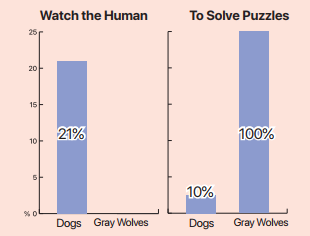Do you live with your pet at home? You may know that a companion animal such as a dog is loyal to its guardian, and follows people a lot. However, why does a dog do that? Have you ever thought about that? Let us introduce you to the genetic hypothesis hidden in the reason ........ Ed

The global pet market is growing every day. The main reason behind it is the growing tendency to think of pets as part of the family. Among many companion animals, the dog has the oldest history with humans. Dogs run towards their owners, wag their tails, start licking, and never leave their surroundings, all these showing their blind loyalty. Why are dogs so friendly, sociable, and loyal to humans? The reason for this will be investigated through a genetic hypothesis.

This hypothesis was studied by Professor Bridgett vonHoldt and Emily Schuldiner. They conducted a study on 18 dogs and 10 gray wolves that measured how close dogs and wolves felt to humans. It is an experiment on ABS (Attention Bias toward Social stimuli), HYP (Hypersociality), and SIS (Social Interest in Strangers). To mention a few experiments, when wolves and dogs were compared, 21 percent of dogs and 0 percent of wolves looked at humans from the same distance. Also, 100 percent of wolves gazed at the puzzle box for solving the problem. On the other hand, dogs shifted their behavior toward asking humans for help, and 10 percent of the dogs looked at the puzzle box.

Genetic data and behavioral comparison studies on dogs and gray wolves revealed a genetic link to affection in dogs. It is the discovery of a gene for a protein called ‚GIF21‘ in the 6th gene region of dogs. The ‘GIF21’ protein is a gene known to cause WBS (Williams- Beuren Syndrome) in humans. In case of humans, it is a special case where it is expressed as an abnormality in chromosome 7. WBS is not shy and shows strong sociality and excessive intimacy with people. However, people with WBS have slightly low intelligence, and their appearances and health are also affected. Thus, ”We‘ve discovered a very important genetic component that gives us traits that help the process of taming wild wolves into polite dogs,” says vonHoldt. In other words, a dog can be a wolf version of WBS.
This hypothesis provides evidence that mechanisms for improving sociability exist across species. It also argues that dogs are genetically selected to serve as human companions, contrary to previous studies that suggest that dogs may have acquired cognitive abilities during domestication. This can be expressed as a romantic word, “a disease that loves humans.” As if to repay this gesture, I hope that humans will love and take care of the puppies that trust and follow us unconditionally, like a member of the family.
Jung Dong-min (ST Reporter)
dongmando@soongsil.ac.kr


